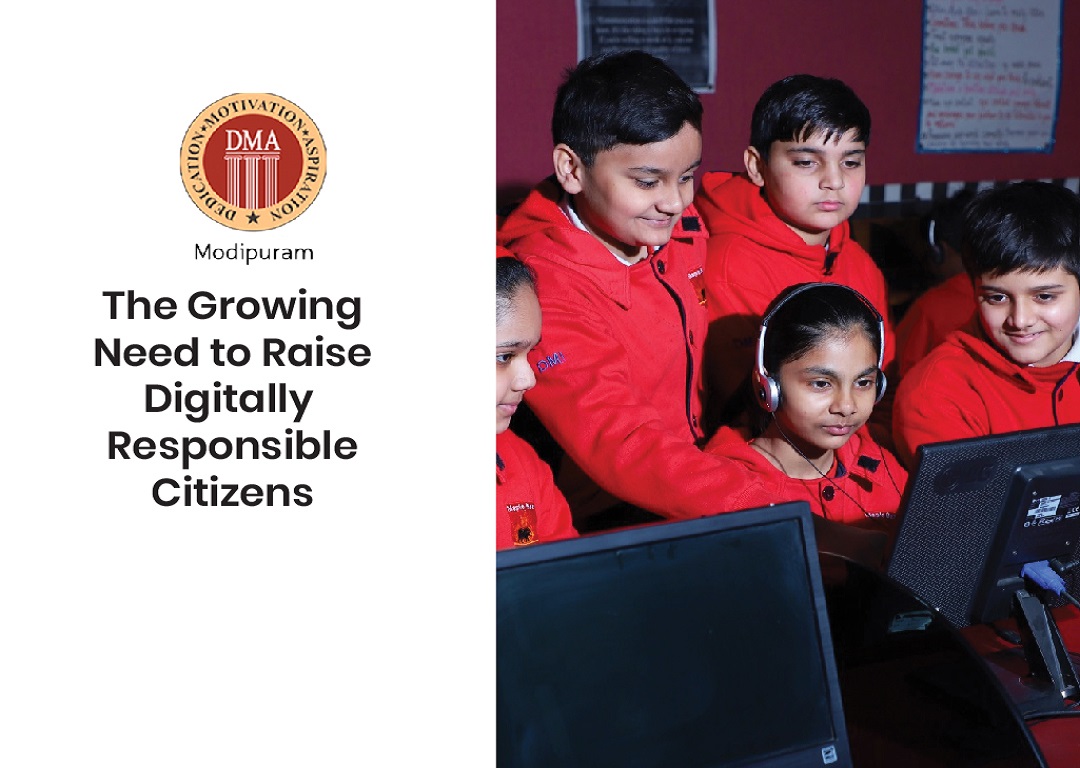The digital world is rapidly expanding and changing. With tech companies releasing products so quickly, there is little time for anyone to pause and consider potential problems with their use. Too often, when we buy new digital technology, we are only concerned with the bells and whistles and fail to consider the implications it is likely to put on our children. This is where ‘digital citizenship’ comes into play, especially for children in their formative years.
Being a digital citizen entails taking responsibility for our technological advancement. This also implies that we must take responsibility for how we communicate online. At Dayawati Modi Academy, one of the best school in Meerut, we firmly believe that as our children embark on this virtual learning medium, they must have the necessary guidance on how to navigate technology safely and securely. So today, in this article below, we will share with you all a few tips with regard to online safety and etiquette, which we believe everyone should be aware of. Let’s delve in without any further ado.
Key to Raising Responsible Digital Citizens
First things first, treat media in the same way that you would any other environment in your child’s life. The same parenting principles are applicable in both the real and virtual worlds. Set boundaries; children require and expect them. Know your child’s online and offline friends. You should be aware of the platforms, apps, software, etc. that your children are using, what websites they visit, and what they are doing online. This done right, you would be able to keep away a lot of safety issues that keep lingering in the online world.
Adhere to the ‘Do as I Do’ Principle
Children are natural mimics. They do what they see and incorporate it much more quickly. Thus, instead of telling them what to do, show them how to do it. Begin by turning off your cell phones and other electronic devices during meals and family activities. If everyone in the family follows the rules, children will feel more compelled to do so.
Pay Close Attention to Their Online Activities
Understand what kind of websites your children are visiting and what they are doing there. Let them know that online cheating, lying, and cruelty in any form are not to be tolerated, and if at all they come across anything like this, they should come and tell you immediately. Right and wrong should be extended to a child’s online and mobile life. This should be accomplished through open communication with children.
Set Clear Boundaries & Stay Firm About Them
Setting fixed screen timelines for the family and putting in place necessary agreements aids in digital regulation at home. Establish a clear time for using the internet so that the children understand when it is appropriate to use mobile phones or technology.
A Balance Should Be Encouraged
Encourage your kids to partake in offline activities more often that do not require a gadget or mobile device. This will allow them to maintain a healthy balance between the physical and digital worlds.
Set Answerability
Using digital media may indeed be a privilege. However, to ensure its safe and responsible use, you must set a clear understanding of the rights and responsibilities that come along with it. Make it clear to them that family time and other essential tasks always come before spending time on the internet. Let them know that it is their responsibility to complete the essential tasks, like routine chores or family time, before they get on the net.
Explain What’s at Stake
We at Dayawati Modi Academy, ranked among the best school in Meerut, always keep our pupils reminded that whatever they do online remains there in the form of their digital footprints. Thus, whenever they are surfing the internet, they must remain aware of their activities in the digital world. We firmly believe that children need to know that there are people of all sorts in the online arena. If they have their friends online, there will also be hackers, bullies, stalkers, etc. As such, it is very much necessary that they do not indulge in wrongful practices online and use the internet only for the right purposes.
Conclusion
Remember, you cannot expect a child to start behaving like an adult overnight. It is on you, being their parents, to ensure that they grow up to be responsible citizens, socially and digitally. Keep a vigil on your child’s behaviors rigorously and, if needed, be firm on the usage of the internet. Having said that, we also understand that media-associated digital devices are an integral part of our world these days. The advantages of the technology, if used moderately and suitably, may be nice. However, if used the other way round, it could attract severe problems. There is hence the pressing need to make our children grow into digitally smart as well as digitally responsible citizens so that they know how to selectively pick and choose the positive aspects of the digital world while keeping all the negativity at bay.

